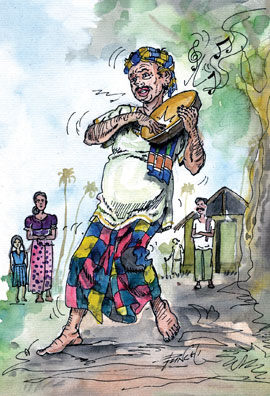It happened in the Himalayas
 Figuratively putting it, the scene presented a sea of giant green
canopies interspersed with equally big boulders. And placing the area
geographically, it was the thickest area of the gorgeous Himalayan
terrain where the most incredible things happened in the days of yore.
Into its coves, crowned heads withdrew to avoid the hustle bustle of
city life and fastidious royal courts and then came their spouses to
share the glory-cum-trauma of wildlife. Figuratively putting it, the scene presented a sea of giant green
canopies interspersed with equally big boulders. And placing the area
geographically, it was the thickest area of the gorgeous Himalayan
terrain where the most incredible things happened in the days of yore.
Into its coves, crowned heads withdrew to avoid the hustle bustle of
city life and fastidious royal courts and then came their spouses to
share the glory-cum-trauma of wildlife.
The wildest and most incredible of events could be staged here such
as the slow drift of a rock that blocked a cave. It was dawn and the
mother Yakkini was yet fast asleep. Her son,a freedom loving youth had
just managed to move the barring rock and get out into the wide world.
Sounds familiar? No. It is not prince Sinhabahu but another of the
same calibre. Name?
 Sorry. I could not catch the name, sounded like Padamanavaka. A
Jathaka tale? That too I am not sure. Featherhead writing big, of what
are you sure then? Don’t blame me. This is what happened. Sorry. I could not catch the name, sounded like Padamanavaka. A
Jathaka tale? That too I am not sure. Featherhead writing big, of what
are you sure then? Don’t blame me. This is what happened.
Vendors
I was seated years back in a Kegalle bound coach in the Pettah bus
stand amidst the usual cacophony of vendors selling their wares, mothers
calling out to lost kids and red bandanas flashing the muscular might of
those, with nothing worthwhile to do, but ever ready to start a scuffle.
And then a man entered the scene beating on his rabana and singing
his Viridu. At first everyone including me gave a lethargic ear but
faintly I heard the words, Apa Maha Bosathun and Padamanawaka. Perhaps
my imagination filled the rest making me conclude that the Viridu man
was weaving a Jathaka tale into a story. Never guessed it was going to
be didactic.
However, he had captured his audience by now awaiting the departure
of the vehicle. About ten more seats to fill. So the Viridu singer could
certainly go on thanks to the avarice of the coach operators who would
not budge till all the seats were filled. Now the man got in to make
himself more audible and also to make his own “cash—collecting” activity
more feasible. Nobody sings for nothing these days.
Unusual glare
Back to the Himalayan terrain. The Yakkini awakens and notices an
unusual glare within the cave. Further she notices her son’s absence.
Then the truth ,the stark truth dawns on her. Her son has escaped from
the cave. Many a time he had striven for this task but today he had
accomplished it.
Frantically she gets out of the cave herself and runs through the
thick forest seeking for her son.
The Viridu man sings submerging all the chaos in the Pettah bus stand
with his melodious voice and the beat of his rabana,
“The Yakkini, distraught, now runs after her son,
Through the giant trees, through the giant rocks,
Will she find him, her precious only child.
She beats her ample breasts and cries out in torment,
Ah! My dear son, answer me, where are you?
The passengers hold their breath. Never mind the wait for the empty
seats to fill. Everyone is anxious about whether she finds her son or
not.
Attention
The Viridu singer goes on, walking up and down the aisle of the
coach, the coins trickling on to his rabana, a scarlet bandana swinging
on his head. The audience is following the story with rapt attention,
though they do not suffer from gullibility that this was a recent drama.
Most of them know that it occurred a millennia ago when Yakkinis roamed
the North Indian forests.Now the distraught mother comes to a river bank
and lo and behold! Or Budu Ammo, as they say in local parlance, the son
she had brought up so protectively is on the other side of the river,
gesticulating wildly to show that he is out to conquer all he sees.
The beat on the rabana increases to enhance the melodrama.
“Come back, my son, come back!”
“No. Amma. I want to see the wide world,
I am tired of that prison, the cave.”
But expostulates the mother.
“You know no vocation to live in that wide world
It is a terrible place
That raises no hand to give free
One has to work and work and work,
Otherwise you are ruined.
So come back and I will teach you a trade or two,
So that you can fit into the cruel wide world.”
The seats in the bus now filled, the conductor shoos the singer away.
And so all of us are denied the end of the tale.
I myself was enroute to the venue of an Extended Adult and Youth
Education Progarm in Kegalle. Already retired I was given the option of
choosing my topic I found myself talking on “The need for vocational
training among the youth.” Soon I was embroiling my speech with the
Viridu singer’s tale that kept the audience in thrall.
I wished that the raban player was there to accompany me and sing
melodiously those lines,
“You know no vocation to live in that wide world,
Which is a terrible place , not raising a hand to give free,
So one has to work, work and work.” |

